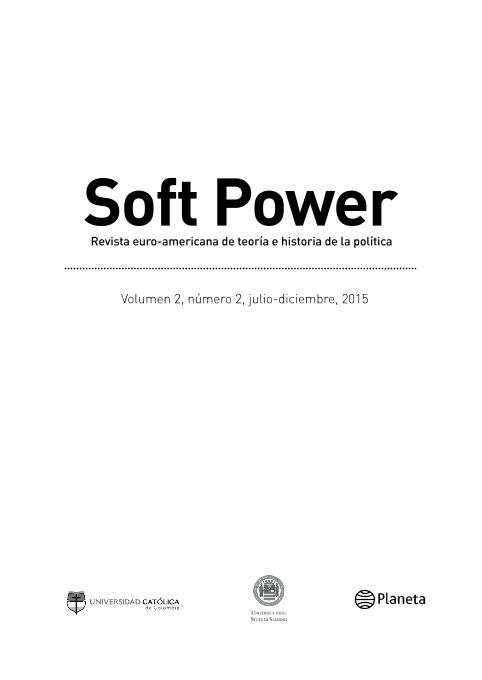Mostrar el registro sencillo del ítem
dc.contributor.author
Carniglia, Luciano Andrés

dc.date.available
2019-03-06T21:24:26Z
dc.date.issued
2015-12
dc.identifier.citation
Carniglia, Luciano Andrés; Construir lo humano: Mutaciones del poder en la lectura foucaultiana del liberalismo; Planeta; Soft Power; 2; 2; 12-2015; 175-189
dc.identifier.issn
2389-8232
dc.identifier.uri
http://hdl.handle.net/11336/71125
dc.description.abstract
La lectura que Foucault realizó hacia fines de la década del setenta del neoliberalismo alemán, francés y norteamericano en su curso Nacimiento de la biopolítica, ha sido recientemente leída por algunos intérpretes de su obra como un alineamiento ideológico con los postulados y el modelo de sociedad que dichas perspectivas presentaban. El presente artículo buscará aportar, en oposición a ese tipo de apropiaciones, algunos elementos para una lectura que nos permita poner de relieve lo que entendemos constituye la dimensión específica del análisis que Foucault se propuso realizar del liberalismo y, en especial, del neoliberalismo norteamericano. Y ello con vistas a señalar su importancia para una lectura política o, como afirmaría Foucault, “políticamente relevante”, de lo que a las claras dista de ser una mera teoría económica. Para ello, centraremos la atención, principalmente, en dos aspectos. En primer lugar, siguiendo el desarrollo del concepto de gobierno, buscaremos sugerir cómo pudo darse, en la lectura de Foucault, un desplazamiento en la idea de vida y de los alcances sobre ella de las prácticas de gobierno desde la perspectiva del liberalismo clásico a la del neoliberalismo norteamericano; y, en un segundo momento, intentaremos aportar algunos elementos para pensar esa “relevancia política” a la que antes hacíamos referencia.
dc.description.abstract
The lectures given by Foucault at the end of the seventies on German, French and American neoliberalism in his course The Birth of Biopolitics, have been recently read by some interpreters of his work as an ideological alignment with the principles and the model of society that these perspectives present. The aim of this article is to provide, against this kind of readings, some elements that allow us to highlight what we consider is the specific dimension of Foucault’s analysis of liberalism and, specially, of American neoliberalism. We will do this in order to emphasize its importance for a political reading or, according to Foucault, a “politically relevant” one, of what is clearly far from being a mere economic theory. To this end, we will focus mainly on two aspects. First, following the development of the concept of government, we will attempt to explain the shift in Foucault’s notion of life and in the scope of its capture within governmental practices from the perspective of classical liberalism to that of American neoliberalism; second, we will try to provide some elements to think that “political relevance” aforementioned.
dc.format
application/pdf
dc.language.iso
spa
dc.publisher
Planeta
dc.rights
info:eu-repo/semantics/openAccess
dc.rights.uri
https://creativecommons.org/licenses/by-nc-sa/2.5/ar/
dc.subject
Gobierno
dc.subject
Vida
dc.subject
Normatividad
dc.subject
Verdad
dc.subject
Naturalidad
dc.subject
Neoliberalismo
dc.subject.classification
Estudios Religiosos

dc.subject.classification
Filosofía, Ética y Religión

dc.subject.classification
HUMANIDADES

dc.title
Construir lo humano: Mutaciones del poder en la lectura foucaultiana del liberalismo
dc.title
Constructing the human: The power changes in the foucauldian interpretation of liberalism
dc.type
info:eu-repo/semantics/article
dc.type
info:ar-repo/semantics/artículo
dc.type
info:eu-repo/semantics/publishedVersion
dc.date.updated
2019-02-28T12:46:17Z
dc.identifier.eissn
2539-2239
dc.journal.volume
2
dc.journal.number
2
dc.journal.pagination
175-189
dc.journal.pais
Colombia

dc.journal.ciudad
Bogotá
dc.description.fil
Fil: Carniglia, Luciano Andrés. Consejo Nacional de Investigaciones Científicas y Técnicas; Argentina. Centro de Investigaciones Filosóficas; Argentina. Universidad de Buenos Aires. Facultad de Ciencias Económicas; Argentina
dc.journal.title
Soft Power
dc.relation.alternativeid
info:eu-repo/semantics/altIdentifier/url/http://www.softpowerjournal.com/web/?page_id=74
dc.relation.alternativeid
info:eu-repo/semantics/altIdentifier/url/https://editorial.ucatolica.edu.co/ojsucatolica/revistas_ucatolica/index.php/SoftP/article/view/1776
dc.relation.alternativeid
info:eu-repo/semantics/altIdentifier/doi/http://dx.doi.org/10.17450/150211
Archivos asociados
